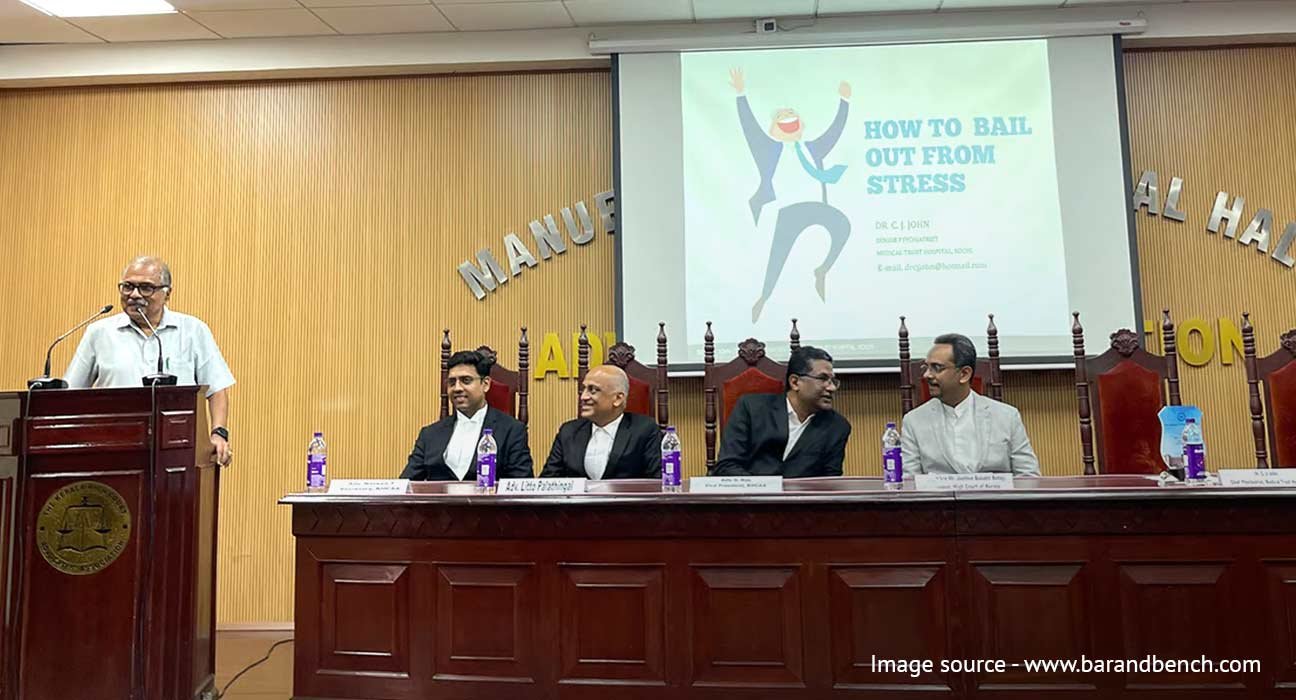A mental health awareness program for advocates was held on Wednesday by the Kerala High Court Advocates’ Association (KHCAA) in collaboration with Maithri, a non-governmental organization (NGO) based in New Delhi.
Glimpse of Mental Health Awareness Programme:
Dr CJ John, the chief psychiatrist at Medical Trust Hospital, gave the keynote speech and Justice Basant Balaji launched the awareness campaign. According to Justice Balaji, “Having an ally can benefit stress management. Additionally, he pointed out that even among teens and adolescents, suicidal thoughts are on the rise. Children used to talk to their parents about their problems in the past. Parents today, as in matrimonial matters, lack time. Stress can be reduced by having someone to talk to.” In the campaign, they provided advice to advocates on how to make sure they feel at ease at work and urged advocates to offer their assistance to other advocates who are experiencing stress.
Coping Strategies for Advocates’ Stress Management:
Everyone experiences stress from time to time, and advocates are no exception. It’s no secret that advocates deal with difficulties daily that are extremely upsetting. The daily obstacles faced by advocates working alone or in small firms are very common. Amongst them are workload, extended workdays, absence of vacation, billable hour expectations, and interpersonal challenges. As a lawyer, you probably already have a good understanding of how demanding a job can be. When you take into account the additional stress of maintaining your legal practice, it makes sense that you could feel overburdened, puzzled, depressed, disoriented, or furious.
Here are a few coping strategies for handling stress
1. Try to Remain Adaptable and Take Control:
Try rephrasing a stressful incident to see if there is a positive aspect you missed. Look past your initial reaction. Likewise, try other coping mechanisms if a certain scenario doesn’t seem to work with one particular coping mechanism. Our perception of stress is largely influenced by our level of controllability over an event. Try to get as much physical control over your surroundings as you can. But remember, no matter how hard we try, some things will always be out of our control.
2. Minimize Your Workload and Engage in Regular Exercise:
You don’t have to handle everything alone, despite the desire! In case you operate your practice or hold a managerial role, make sure you appoint qualified individuals right once and assign them ample responsibilities. If you are feeling overburdened by a case or file and you are working in a small team, don’t be hesitant to ask for help. Lastly, if at all possible, insist on assigning cases or projects at a time that will not require you to work long hours. Studies indicate a beneficial correlation between physical activity and the reduction of symptoms related to depression and anxiety. Exercise has the potential to improve general health and boost self-esteem.
3. Use Problem-Focused Coping Mechanisms and Gain Enough Sleep:
Such as having an honest conversation about a problem, gently but firmly facing a customer who is causing you trouble, or creating a to-do list and following it through to reduce stress. Although sleep is essential for the healing of the body and mind, many people regularly use alarm clocks to prevent themselves from getting enough sleep. Our capacity to handle stressful situations is negatively impacted by sleep loss in various ways, including decreased cognitive performance and irritability.
4. Set a Lot of Short-Term Objectives and Engage in Activities:
Both major stressful events and daily annoyances can be temporarily distracted by activities. Hobbies provide us with the chance to interact with people who have similar interests to our own and also give us time to ourselves. To feel as though we are making progress toward our goals and to stay motivated, we all require periodic reinforcement. Make sure you have several little objectives in addition to a few major ones.
5. Go on Vacations and Make Use of Social Support:
To stay energized and prevent burnout, everyone needs to take periodic vacations. Assume personal responsibility for using your allotted vacation time, and leave your laptop and mobile phone at home. Friends, family, coworkers, and close companions can provide a lot of social support, which is an essential coping mechanism. They can offer us emotional support, practical assistance, problem-solving skills, and a fresh perspective on the situation.













Leave feedback about this